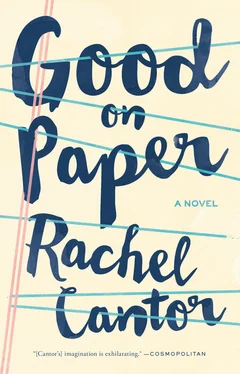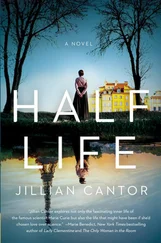I thought you didn’t like Pammy.
What’re you talking about?
Did you have enough breakfast?
Pammy’s mother bought Drake’s Cakes! she said mysteriously.
Oh, I said. Does Drake bake a good cake?
There was that look again.
Okey doke, I said. Eskimo kiss!
We rubbed noses and off she ran.
27. FALSE FRIENDS AND TRUE

I found myself looking out the bedroom window at Benny’s side display, wishing I were a birdwatcher and could produce binoculars. What did I hope to see? Benny and Psychogirl smooching by All Things Green (books on the environment, money, and “envy management”)? Ahmad was hum-singing along with Glenn Gould in the living room. Maybe he thought he could draw me out, pretend nothing had happened, pretend he wasn’t playing Connecticut tug-of-war with our little girl. He needed to apologize: confession, contrition, reparation, change.
Benny, Connecticut, the possible addition to our family — I needed help sorting it out, but where? Once upon a time, I’d have called Jeanette, Jonah’s sister. She was the one friend other than Ahmad who’d stayed true when I had a child. Some dropped me; others changed the subject when I talked about cracked nipples, the miracle of life. I hadn’t felt the loss, because I had Ahmad and Andi — I had my family. But Jeanette became a better friend then, visiting when Ahmad was teaching so I could shower, bringing me chocolates, telling somewhat relevant stories about her Dotty’s colic, never asking when I’d lose my baby weight. We didn’t have much in common except high school in Rome, and Jonah, but I enjoyed our confidences and the girly things we did — like getting our legs waxed and watching the weepies. She wasn’t great at managing her own life, but she was terrific at managing mine.
My stories ended that. She hadn’t minded “Tibet, New York,” about Jonah’s last days — it had moved her, even, she’d said so more than once. But in “Domino,” my most recent, published a year ago, I’d imagined us in high school: Jonah at fourteen, defacing a portrait Ahmad had made of me, my Botticelli hair flying wild, and jerking off in a tree as he watched T. and me making out in a copse. I made things up to “tell a deeper truth”; Jeanette said I’d made Jonah out to be a pervert — why would I do that? She wouldn’t return my calls.
When Ahmad went to his studio, I grabbed a book from his bookshelf: Poverty and Landlessness . Tiny print, grainy black-and-white photos — it was perfect! I called Jeanette, said her daughter Dotty had left a book last time she’d babysat. I’d be in the neighborhood, should I maybe drop it off?
Oh, Jeanette said. Sure.
•
I brought Romei’s “Screen” with me and reread it on the downtown bus — the crashed parties, the rendezvous in the park. I stalled in the consummation scene, stared at it as we bumped down Broadway, came to myself only after we passed Fairway. I elbowed my way off and walked back up to Seventy-ninth. As I waited for the crosstown, I kept staring at the page. Something wasn’t right.
False friends! The passage was littered with them. Words in one language that trick you into thinking they’re related to words in another (like Andi, who appears related to Ahmad, but isn’t). Like fame , which in Italian means not fame but hunger.
When the crosstown arrived, I went straight to the back and looped my arm around a pole. Had false friends insinuated themselves into Romei and Esther’s Eden? No. Were they reflected in the mirror as Romei posed in the clothes he’d “liberated” from his friends’ closets? No. They were only here, in the consummation scene. Baffled, I got off at Sixty-eighth and Third. Had Romei meant to do this? He must have. But why? Was he testing me, daring me to make a novice’s mistakes?
C’mon, Shira, I thought as I walked up Third Avenue. Why would he do that? Surely he was making a point about the lack of correspondence between the character Romei and his English-speaking love. Interesting, but who would notice but me? I couldn’t make his plays on words evident in translation — once translated, they’d disappear. (No one would look at the word bookstore and think, Bookstore is libreria in Italian, which doesn’t mean library —what is that crafty poet up to!) Romei’s joke would be visible only to the reader of Italian, and only if he were thinking about how it might translate.
Was it my imagination? No, because there they were. Ten classic examples on one page alone.
But I had arrived at Jeanette’s building, a freakishly tall stack of condos on East 70th. I pushed the pages into my mom-bag.
Jeanette had moved here from Brooklyn Heights, determined to start anew after her divorce. She’d tossed everything she’d purchased with her ex, and redecorated every room except Dotty’s, which Dotty, at the tender age of twelve, had refused to cede to her mother’s stencils and window treatments, preferring instead to cover her walls with anything that might remind her of her uncle — or rather, her memory of Jonah or, increasingly, her memory of having had a memory of him: photos of Tibetan tangkas , monkey-headed gods, reproductions of his paintings from a gallery catalogue, a photo of him holding baby Dotty on his lap, blown up to poster size.
Jeanette thought it fetishistic , creepy even, but put up with it because, as her therapist said, we all grieve differently.
How could I forget him? Dotty asked one day. Uncle Joe was everything to me, but now all I remember is him looking like this, she said, pointing at the poster-size photo, or that, pointing to framed photos on her bookshelf.
That’s life cutting you some slack, I said.
It’s not right to forget someone you love, she said.
You were only seven, I said. Give yourself a break.
So the divinities came off the walls, replaced by teen idols, boys I didn’t recognize, with longish hair and doe eyes and, later, Che Guevara, images of the people united, never to be defeated, marching toward their bright, socialist-realist future.
Jeanette eventually combined her interior decoration mania with real estate work, entering the renovate-a-crummy-building-and-sell-it-for-a-killing business. Only she joined the bandwagon a moment too late and, I suspect, applied too bourgeois a taste: her renovations didn’t appeal to the Lower East Side set. She declared bankruptcy, but in the process found a new beau — a master carpenter (her term, not his) named Georges, whom she called her Silver Lining, as in, there always is one. Georges was plump and affectionate, except when he disappeared, returning days later all glum and taciturn. It’s just his way, Jeanette said, forgetting that this had been her ex’s way as well. Soon she was back to selling real estate and happier than ever. Or she was last time I saw her.
I barely recognized her when she came to the door. She used to have what you might call big hair , but she’d cut it short — a mistake. She was wearing a white blouse with a red-piped Peter Pan collar, puffed sleeves, a red knee-length skirt, and a ruby pendant in the shape of a heart.
Like the new haircut! I said, when she said hello but didn’t invite me in. Very smart!
Thank you, she said, and almost smiled, but remembered herself.
Does it have to be this way? I said. Really? We were friends once.
Jeanette shook her head, as if dismissing me. Do you have the book? she said. For a crazy moment I thought she was asking for Romei’s pages, that she’d been ordered by the Great Man to get them back.
Читать дальше













